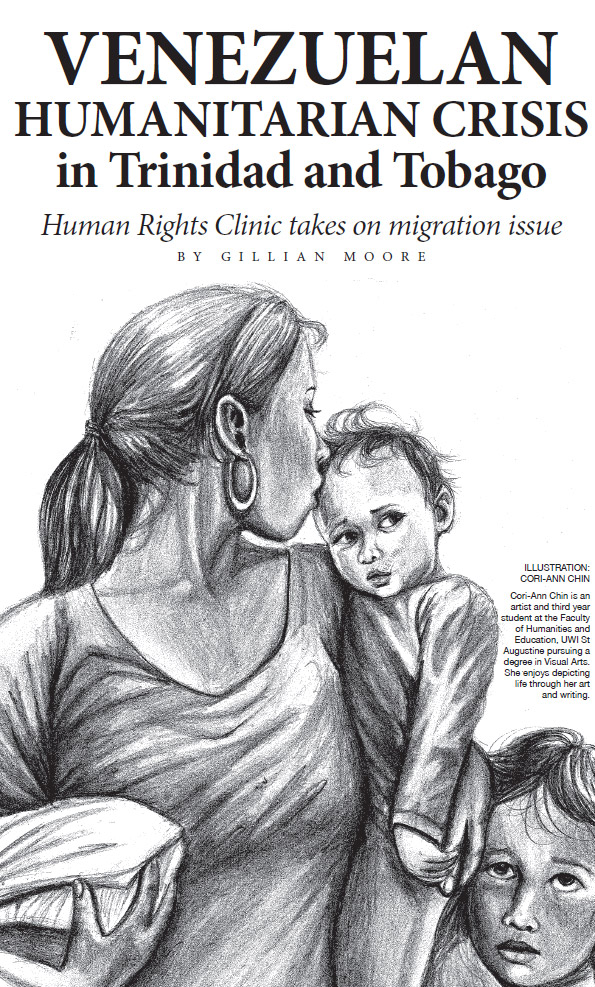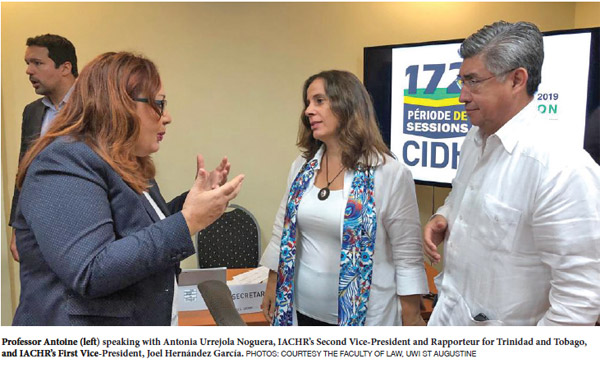
 Gang rape and abuse without recourse. Denial of legal rights. Endangerment and exploitation of children. Human trafficking. These are just some of the horrors being faced by Venezuelan migrants in Trinidad and Tobago, highlighted during a May 8 regional hearing on human rights. Gang rape and abuse without recourse. Denial of legal rights. Endangerment and exploitation of children. Human trafficking. These are just some of the horrors being faced by Venezuelan migrants in Trinidad and Tobago, highlighted during a May 8 regional hearing on human rights.
A UWI-led delegation painted a picture of the situation on the ground before the Inter-American Commission on Human Rights (IACHR) in Jamaica. The resulting portrait was an ugly, incriminating and disturbing one.
The delegation, headed by Prof Rose-Marie Belle Antoine, Dean of the Faculty of Law at UWI’s St. Augustine Campus, included Dr Priya Kissoon, Head of the Department of Geography, and Dona Da Costa Martinez, Executive Director of the Family Planning Association of Trinidad and Tobago (FPATT).
The IACHR, part of the Organisation of American States (OAS) works to protect human rights in the Americas. Professor Antoine noted it was the first time the University has formally come before the international body.
She was inspired to pursue the hearing, in part by xenophobia: "I find it incredible, the callousness we are hearing from ordinary people" and found it ironic, in light of the recent Windrush scandal in the UK, that "we complain about how we were treated and, without even thinking, we don’t see the parallels.”
"The Caribbean does not see itself as having human rights violations," she reflected, and yet Venezuelan migrants, fleeing to Trinidad and Tobago in increased numbers, are facing harsh realities that see their very presence increasingly stigmatised and criminalised.
Professor Antoine said the administrative failure of the country to put legal and policy frameworks in place has led to adverse conditions for Venezuela migrants, who find themselves unable to regularise their status or have access to health, work, education and basic protections.
“Human rights violations are occurring.” she declared. Making matters worse, instead of a humanitarian approach, we seem to be going in the opposite direction.
Government has actually decreased previous protection measures meant to be alternatives to detention. Instead, law enforcement has relied on the more archaic Immigration Act — which provides no provision for asylum seekers or human rights standards for migrants.
“The right to seek and receive asylum is enshrined as an individual human right,” Professor Antoine asserted, “yet migrants and refugees are increasingly criminalised in Trinidad and Tobago.”
Despite ratifying the UN's Refugee Convention in 1951, the twin-island Republic has not been following the UN Refugee Agency’s operating procedures. Migrants face exploitation by officials, ad hoc detentions and deportations, even where asylum has been granted, and a breakdown of systems at all levels, undermining migrants’ rights and forcing them into illegality.
“Irregular migration is not a crime. Detention should be a last resort.”
She said while Government’s recent two-week amnesty period for migrants was “a step in the right direction,” it was “unclear in scope,” and does not provide due process guarantees.
 Antoine also hailed the multi-disciplinary nature of the hearings, with forensic human geographer Dr Kissoon and FPATT shedding light on human and social aspects of the issue. Antoine also hailed the multi-disciplinary nature of the hearings, with forensic human geographer Dr Kissoon and FPATT shedding light on human and social aspects of the issue.
Kissoon told the panel: “While men are increasingly stigmatised as criminals, women are labelled as hypersexual and face prejudice, discrimination, harassment, and assault.”
Local men are “emboldened by the stereotype” and by the vulnerability of immigrant women, she said. “Verbal assaults and harassment are prolific and seemingly condoned in the absence of any recourse.”
She shared a harrowing account of an adolescent girl whose flight to Trinidad and Tobago exposed her to sex trafficking and unwanted pregnancy.
“When borders are enforced in a draconian manner, people take greater risks, with more likelihood of exploitation,” she said.
Children were especially vulnerable, with many lacking access to education and healthcare.
Many migrants' living conditions are inadequate and unsafe, especially for children. An International Organisation for Migration (IOM) survey of pregnant Venezuelan females in Trinidad and Tobago, revealed that 20 per cent were children.
Even police and detentions and immigration officials have been implicated in kidnapping, rape, sex trafficking, and sexual abuse of detainees.
Kissoon said, with “coordinated multi-stakeholder effort, we can work towards rights-based sustainable development for the nation.”
“Recognising the humanity of the non-national will help us to recognise our own humanity.”
FPA Executive Director Dona Da Costa Martinez told the IACHR Commissioners of the work her organisation has been doing with the migrant community. She said they had been able to establish trust and were even sought as primary care providers for children, some of whom were malnourished or suffering from diabetes.
She said through the support of international agencies, FPATT was able to provide lifesaving sexual health and psycho-social support to migrants, meeting needs inadequately provided by the State. The association provides language interpreters and case liaisons, with special late hours to facilitate those with inflexible work schedules.
Despite misconceived fears that migration leads to the importation of infectious disease, FPATT had found that Venezuelan females are more vulnerable to sexual and reproductive health problems and violence while in Trinidad and Tobago.
 Da Costa Martinez said the State’s response was poor: “Although the Ministry of Health declared migrants were free to access public health services, the reality is that no mechanisms are in place to ensure that migrants who do so are not persecuted, prosecuted, deported, or even detained.” Da Costa Martinez said the State’s response was poor: “Although the Ministry of Health declared migrants were free to access public health services, the reality is that no mechanisms are in place to ensure that migrants who do so are not persecuted, prosecuted, deported, or even detained.”
Responding to the presentations they had heard, IACHR Commissioners Antonia Urrejola, Second Vice President; Joel Hernández García, Vice-President of the Inter-American Juridical Committee; Luis Ernesto Vargas, Rapporteur on the Rights of Migrants; and, Francisco Eguiguren, Rapporteur on the Rights of Human Rights Defenders expressed shock, sadness, and anger, especially because Trinidad and Tobago had sent no State representative to the hearing.
Vargas called the situation “perverse” and said the State “should have been here to answer to this “serious, documented crisis” that saw “migrants’ rights violated in such a flagrant way.”
“Migration presents problems for States, but there is support.” Hernandez noted that Trinidad and Tobago is a member state of the OAS, thus giving the IACHR the competence to act fully in the situation.
Professor Antoine said the Commission's work has helped topple dictators and she hoped its attention would bring about policy changes to improve the migrant situation.
She felt “If the average citizen would listen, they would feel moved.”
“I would like to think we have that basic humanity.” |





